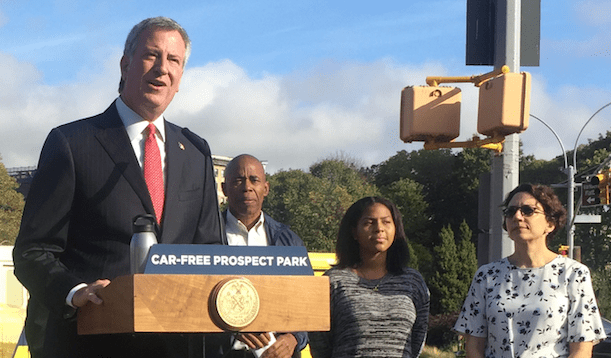As of January 2, no part of Prospect Park will ever be a traffic shortcut again, Mayor de Blasio announced this morning.
Sustained activism for a car-free Prospect Park had already prompted the city to cut the hours when through traffic is allowed down to weekdays from 7 to 9 a.m., and only on the park's east side. With today's announcement, the entire park will be free of private cars at all times.
"The park was not built with cars in mind. They didn't exist. The park was built for people," the mayor said at the Grand Army Plaza entrance. "This is getting back to the original idea of this park, restoring it to its original purpose."
The west side of the Prospect Park loop has been off-limits to motor vehicle through traffic since 2015. Over the summer, DOT and the Parks Department conducted an eight-week car-free pilot to evaluate the impact on traffic on surrounding streets.
Traffic impacts were "minimal," said Transportation Commissioner Polly Trottenberg, and after the car-free trial, fewer drivers used the park loop. Even before the trial, pedestrians and cyclists outnumbered motorists on the loop by more than 1,000 to 300 per hour, according to DOT.
A big proponent of making the park completely car-free has been Brooklyn Borough President Eric Adams, in stark contrast with his predecessor. "I use this park all the time in the morning to bike," Adams said today. "This is a significant moment for us all."
It's been 50 years since the first victory in the campaign to get cars out of Prospect Park. For much of the 20th century, with the city ceding more and more space to automobiles, traffic was essentially allowed on the park loop all day, every day. Then in 1967 the city made Prospect Park car-free on weekends. Not much changed for the next 25 years.
In the 1990s, Transportation Alternatives revived the campaign for a car-free park, gathering tens of thousands of signed postcards calling on Borough President Howard Golden to remove traffic during the summer. Over the course of many years and several thousand volunteer hours -- including massive petition drives in 2002 and 2008 -- advocates were able to get DOT to gradually whittle down the times and places where cars were allowed in the park. Car-free hours were expanded, motor vehicle entrances to the park were cut off, and traffic lanes were reduced.
Today's announcement is the culmination of all those campaigns, right up to the ride for a car-free park during the morning rush hour two weeks ago.
Calista DeJesus, a resident of Prospect Lefferts Gardens and member of Brooklyn Community Board 9's transportation committee, said she looks forward to commuting through the park without having to worry about car traffic.
"Especially riding and walking in the park, and having to commute during rush hour when cars are driving pass, it wasn't always easy being cramped up along with the joggers," she said. "It's really exciting to know [there's] a safe way to commute in the park."






